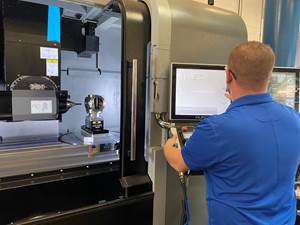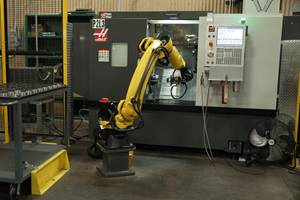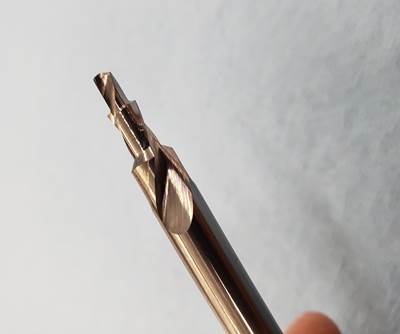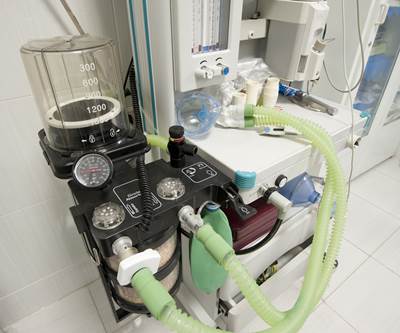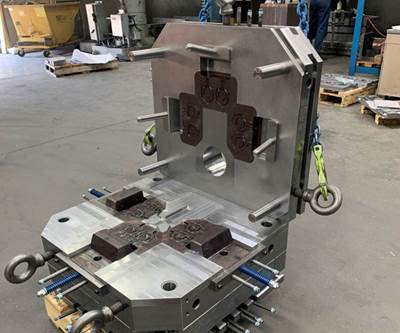Multi-Pallet Machines Help Shop Produce Ventilator Components
NRL & Associates’ business plan relies on using multi-pallet machines for unattended machining, so when two of its customers increased production of ventilators, the shop quickly brought in a new multi-pallet machine and automation system to meet the demand.
Share
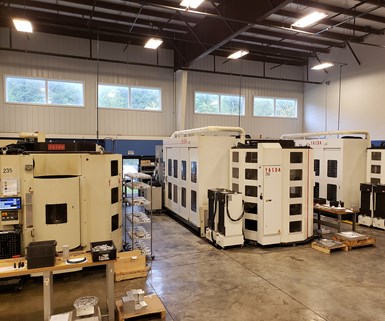
NRL & Associates’ business strategy is based on using multi-pallet machines for unattended machining. Among its multi-pallet machining centers are two Yasda PX-30is, which each have 33 pallets, and a Yasda H-40i, which has 22 pallets. Photos by Nathan Eakins.
NRL & Associates is committed to unattended machining. “Most of the machines we set ourselves up with now are multi-pallet machines,” says Jim Smith, president and CEO of the Stevensville, Maryland, manufacturer. These machines include two Yasda PX-30i five-axis machining centers, which each have 33 pallets, and a Yasda H-40i five-axis machine, which has 22 pallets. The company was also planning to add a five-axis FANUC Robodrill Plus-K automation system with 36 pallets from Methods Machine Tools to its fleet in June or July of this year. But when two customers needed NRL’s help to produce components for much-needed ventilators during the coronavirus pandemic, Methods and its distributor MTA Co. delivered the machine and automation system months early so it could increase production of these parts as quickly as possible.
Transitioning to Lights-Out Machining
NRL & Associates was founded in 1986, and Mr. Smith joined the company that same year. He and two other partners took over the business after the founder passed away in 2006. “We really pushed the growth once we took over in '06,” he says. Between 2006 and 2016, the company doubled in size four times while the owners were paying down the note.
In 2015, the company moved into a 50,000-square-foot facility and invested in its first Yasda — the H-40i. This marked a change for the company, both because it was the first step to unattended machining and because it was a larger equipment investment than it had previously made. Within two years, NRL had added two more Yasdas, the PX-30i machines. Mr. Smith acknowledges that instead of investing in these three machines, the company could have invested in a number of two-pallet horizontal machining centers. “But the problem is that I still need people standing in front of these types of horizontal setups,” he explains. The pallet-fed Yasda machines could be set up to run unattended for long stretches of time.
Indeed, the company aims to get eight hours of continuous runtime from each of its multi-pallet, five-axis machining centers. In order to make this work on the weekends, the shop “gets creative” by scheduling overlapping unattended cycles so employees can load and unload machines and check parts to get maximum efficiency. According to Mr. Smith, the company runs 63 hours between Friday afternoon and Monday morning, with employees only coming in to service the equipment as eight-hour runs come to an end. This equates to a shift and a half of runtime with about 20 hours of input from one or two people. “That’s why we like this equipment so much and how we run,” he says. “And we'll continue to do that. We'll continue to add that type of equipment and run lightly attended or lights out from here on out.”
Moving to the Top of the List
NRL made plans to continue down this path by investing in a new multi-pallet
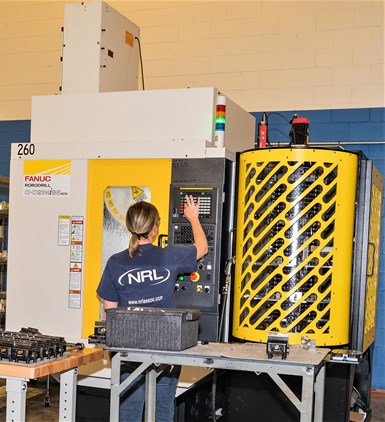
Earlier this year, NRL ordered a new multi-pallet machine, a FANUC Robodrill with Plus-K automation from Methods, in preparation to start producing ventilator assemblies for a former customer. When the coronavirus pandemic hit and the customer’s orders increased, NRL had the machine delivered early.
five-axis machine from Methods in mid-2020, this time a FANUC Robodrill with the Plus-K automation system, which provides a carousel parts carrier and tool holder to further enhance the functionality of the machine. NRL was bringing in this automated machine as part of its preparations for taking on new work from a former customer. This customer was a startup company that produced ventilators and began working closely with NRL in 2012. Mr. Smith says NRL helped with initial designs for the ventilators and ran “a fair amount” of parts for the company on an older machining center. The company eventually moved to another state and went in a different direction with the parts, producing them from plastic. However, these parts weren’t holding up. Returning to metal, the customer reached out to NRL and the two companies started the process of signing an agreement to produce 4,000 assemblies per year for three years. NRL ordered the Robodrill Plus-K from Methods for delivery in June or July, with the expectation that it would arrive when the work was ramping up. But two weeks into negotiations, the customer informed the shop that it had been contacted by the federal government, and it needed to increase the number of assemblies from 4,000 per year to 4,000 per month, indefinitely.
Two weeks into negotiations, the customer informed the shop that it had been contacted by the federal government, and it needed to increase the number of assemblies from 4,000 per year to 4,000 per month, indefinitely.
At this point, Mr. Smith reached out to MTA and Methods to let them know that NRL needed the new system as soon as possible to produce critical ventilator parts. The customer had sent the shop a letter describing the situation, which Mr. Smith provided to MTA and Methods as proof. NRL was moved to the top of the list, and in less than three weeks, the machine was on the floor producing assemblies at a rate of 4,000 per month.
This isn’t NRL’s only contribution to the fight against COVID-19. Another customer contacted the shop about producing ventilator components. NRL typically works with this company’s maternal and infant care division, manufacturing parts for equipment found in neonatal intensive care units, such as incubators and warmers. The two companies have been working together since 1988, and the shop is a top 100 strategic supplier for this customer. “When they got into a jam, they reached out to suppliers they trust and we happened to be one of them,” Mr. Smith explains. This customer needs to produce 22,500 ventilators by the end of the year, and it can’t rely on the overseas suppliers it usually uses. So it went through its list of preferred suppliers and asked NRL to produce 300 assemblies per week.
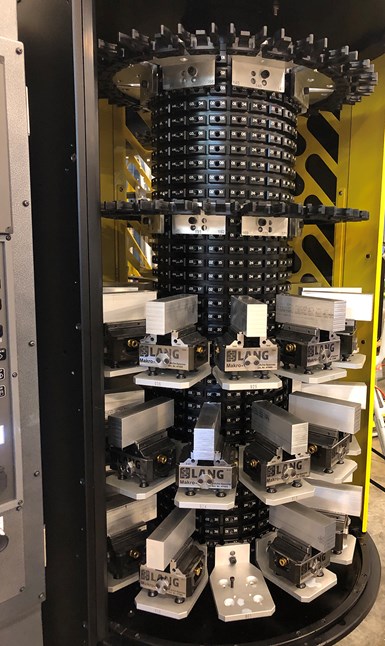
NRL is now producing a number of ventilator components for two customers. The more complex parts go in the multi-pallet FANUC Robodrill with Plus-K automation, shown here, or in one of its two Yasda PX-30is.
NRL is making several parts for both customers, but according to Mr. Smith, all the components are critical. “We're making the heart of the ventilator,” he says. For one customer, NRL is making parts for a three-piece design, which includes a two-piece housing and manifold. For the other customer, it makes several parts, including two manifolds, a gasket and two brass oxygen fittings.
Mr. Smith says all of the ventilator parts have some challenging features, but with NRL’s breadth of experience and machine capabilities, he is confident in the shop’s ability to produce all of the parts. One of the most challenging of these parts has fins that stick up 0.25 inch. The fins are 0.040 inch wide and each have 0.040 inch of space between them. This part, along with the other, more complex components, are made in either one of the two Yasda PX-30is or the new Robodrill Plus-K, while HMCs in the shop produce the secondary parts in the assemblies.
Facing Challenges
NRL must balance this influx of new, critical ventilator work with jobs from its other customers. “We're trying not to upset anybody else,” Mr. Smith says. Because many of its customers are in the medical and defense industries, NRL hasn’t seen much slowdown. “We're trying to service everybody that we can possibly service with limited staff and not knowing who gets quarantined this week or who doesn't,” he says.
NRL has enacted a policy in which staff who are quarantined if they have had contact with a person awaiting COVID-19 test results. If the contact’s results come back negative, the employee can return immediately. If they are positive, the employee is quarantined for 14 days. The uncertainty of staffing due to quarantining can be a struggle, but NRL can’t afford to have an outbreak in its facility. “You don't have a choice,” Mr. Smith says. “You have to protect the rest of the employees.”
This situation has been difficult on NRL’s staff and their families. Employees
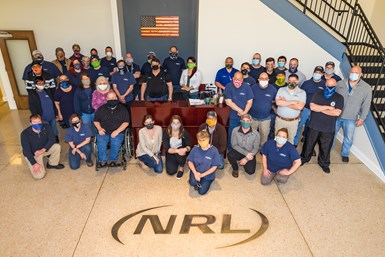
NRL & Associates’ employees have risen to the challenge of producing critical components during a global pandemic. “I can't thank them enough for what they've stepped up and done,” says Jim Smith, the company’s president and CEO.
are coming in as early as 4 a.m. and working as many as 12 or 13 hours per day while taking care of their families. “It's been stressful for everybody,” Mr. Smith says. But everyone has stepped up to the challenge. “Please print this: Our employees are incredible,” he adds. “I can't thank them enough for what they've stepped up and done.”
Mr. Smith says the company is aiming to add six to eight new employees to help deal with the influx of work. “We're actually running ads now,” he says. “We're getting ready to start bringing in the personnel.”
Be Prepared
Operating as normal can be difficult with a stay-at-home order in place, but NRL took some important steps before the order went into effect to ensure it could continue producing without interruption. “We got pretty proactive at the beginning of this whole thing,” Mr. Smith says. Ensuring the business was classified as critical required filling out forms that provided information to the state about the customers the shop is supplying and parts it’s producing. NRL also coordinated with local law enforcement and the chamber of commerce about its status as an essential business.
The shop also made sure to stock up on materials before the state’s stay-at-home order went into effect. “As soon as we started seeing hints of businesses being shut down, and not knowing what was going to happen, we hedged our bets and bought a lot of the materials,” he says. This includes nearly 1,000 feet of aluminum barstock, which is about two and a half to three months' worth of material, far more inventory than the otherwise lean shop usually carries.
On Track for Big Growth
Changes in demand for products NRL was already engaged in producing could result in big growth for the company. NRL is on pace to double its capacity over the course of this year, Mr. Smith says. With its strategy of adding multi-pallet machines for lights-out machining, the company can look for new areas of growth to pursue even as the needs of its existing markets increase.
Related Content
-
Does a Five-Axis Machine Increase Business?
Five-axis machining is enabling custom fabricator Meyer Tool to take on more complex work and helping it produce less complex jobs more efficiently.
-
Five-Axis Machines Speed NASCAR Engine Production
Moving from an aging set of five-axis mills to more advanced machines enabled Hendrick Motorsports to dramatically improve its engine production.
-
Shoulder Milling Cuts Racing Part's Cycle Time By Over 50%
Pairing a shoulder mill with a five-axis machine has cut costs and cycle times for one of TTI Machine’s parts, enabling it to support a niche racing community.
Related Content
Does a Five-Axis Machine Increase Business?
Five-axis machining is enabling custom fabricator Meyer Tool to take on more complex work and helping it produce less complex jobs more efficiently.
Read MoreFive-Axis Machines Speed NASCAR Engine Production
Moving from an aging set of five-axis mills to more advanced machines enabled Hendrick Motorsports to dramatically improve its engine production.
Read MoreShoulder Milling Cuts Racing Part's Cycle Time By Over 50%
Pairing a shoulder mill with a five-axis machine has cut costs and cycle times for one of TTI Machine’s parts, enabling it to support a niche racing community.
Read MoreWhich Approach to Automation Fits Your CNC Machine Tool?
Choosing the right automation to pair with a CNC machine tool cell means weighing various factors, as this fabrication business has learned well.
Read MoreRead Next
Shop Starts Work on Custom Drill for Ventilators Before Purchase Order Came
When this Indiana toolmaker saw an order for cutting tools to make ventilators for coronavirus patients, his workers started grinding before the customer officially hired them.
Read MoreAerospace Machine Shop Uses Past Prototype for Quick Ventilator Part Turnaround
Win-Tech Inc. is one of the many manufacturing facilities shifting focus to fulfill urgent medical needs during the coronavirus pandemic.
Read MoreOne Auto Parts Supplier's Shift to Ventilators: Now Making 1000s of Parts per Week on Die Delivered in Days
GM applying its supply chain expertise to enable successes such as aiding this ventilator maker to expand sourcing for 700 parts.
Read More




